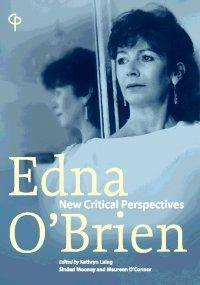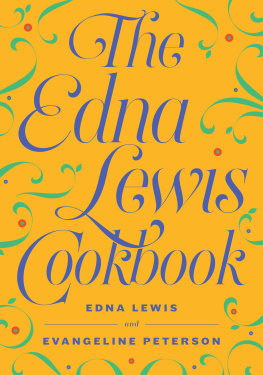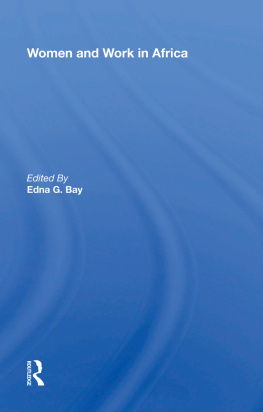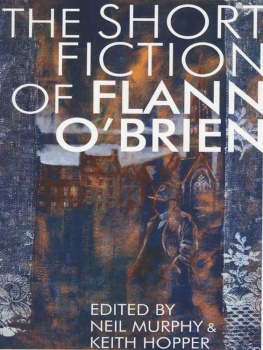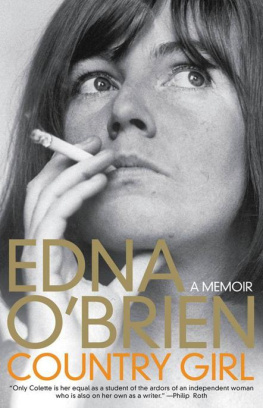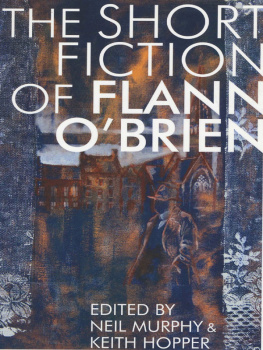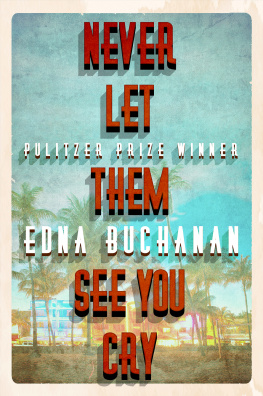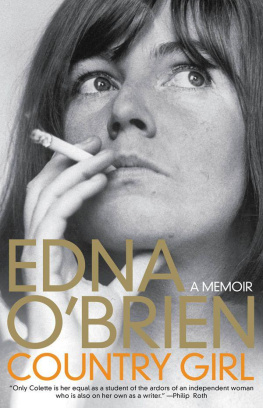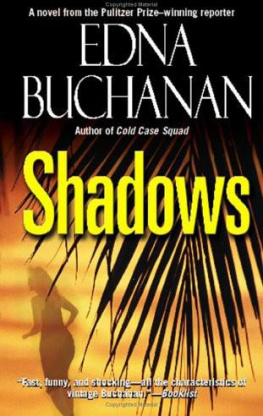OBrien Edna - Edna OBrien: new critical perspectives
Here you can read online OBrien Edna - Edna OBrien: new critical perspectives full text of the book (entire story) in english for free. Download pdf and epub, get meaning, cover and reviews about this ebook. City: Dublin;Ireland, year: 2006, publisher: Carysfort Press Limited, genre: Art. Description of the work, (preface) as well as reviews are available. Best literature library LitArk.com created for fans of good reading and offers a wide selection of genres:
Romance novel
Science fiction
Adventure
Detective
Science
History
Home and family
Prose
Art
Politics
Computer
Non-fiction
Religion
Business
Children
Humor
Choose a favorite category and find really read worthwhile books. Enjoy immersion in the world of imagination, feel the emotions of the characters or learn something new for yourself, make an fascinating discovery.
- Book:Edna OBrien: new critical perspectives
- Author:
- Publisher:Carysfort Press Limited
- Genre:
- Year:2006
- City:Dublin;Ireland
- Rating:4 / 5
- Favourites:Add to favourites
- Your mark:
- 80
- 1
- 2
- 3
- 4
- 5
Edna OBrien: new critical perspectives: summary, description and annotation
We offer to read an annotation, description, summary or preface (depends on what the author of the book "Edna OBrien: new critical perspectives" wrote himself). If you haven't found the necessary information about the book — write in the comments, we will try to find it.
The essays collected here illustrate some of the range, complexity, and interest of Edna OBrien as a fiction writer and dramatist. They will contribute to a broader appreciation of her work and to an evolution of new critical approaches, as well as igniting more interest in the many unexplored areas of her considerable oeuvre.
Edna OBrien: new critical perspectives — read online for free the complete book (whole text) full work
Below is the text of the book, divided by pages. System saving the place of the last page read, allows you to conveniently read the book "Edna OBrien: new critical perspectives" online for free, without having to search again every time where you left off. Put a bookmark, and you can go to the page where you finished reading at any time.
Font size:
Interval:
Bookmark:
~~~~~
A Carysfort Press Book
First published in Ireland in 2006 as a paperback original by
Carysfort Press, 58 Woodfield, Scholarstown Road
Dublin 16, Ireland
2006 Copyright remains with the authors
Typeset by Carysfort Press
Digitized by Green Lamp Media
Cover design by Alan Bennis
This book is published with the financial assistance of The Arts Council (An Chomhairle Ealaon), Dublin, Ireland
This publication was grant-aided by the Publications fund of the National University of Ireland, Galway
Caution: All rights reserved. No part of this ebook may be printed or reproduced or utilized in any form or by any electronic, mechanical, or other means, now known or hereafter invented including photocopying and recording, or in any information storage or retrieval system without permission in writing from the publishers.
This ebook is sold subject to the conditions that it shall not, by way of trade or otherwise, be lent, resold, hired out, or otherwise circulated in any form of binding, or cover other than that in which it is published and without a similar condition, including this condition, being imposed on the subsequent purchaser.
Table of Contents
Kathryn Laing
Sinad Mooney
Maureen OConnor
[Edna OBriens] auspicious literary debut with The Country Girls marked the beginning of a career that now encompasses a body of work including fifteen novels, six short-story collections, plays, television and motion-picture screenplays, poems, childrens books, and non-fiction ranging from essays and reviews to a biography of James Joyce (1999). She always seems to have a novel and poems in progress and continues to write short stories, many published in the New Yorker . In all her work OBrien continues to shock, puzzle, delight, and scandalize her readers as she ventures into new territory.
So ends Robert Hosmers recent entry in the Dictionary of Literary Biography on Irelands best known female writer (16). It would be fair to say that OBrien is best known as a writer of fiction.She is known particularly for the autobiographical nature of her work, and for her exploration of the agonies of love and loss that attend womens experiences (16); the con-struction of female sexuality and the consequences of this for women within a specifically Irish context, and within broader contexts too. These issues have been particularly the focus of her short fiction but, as critics have noted, her latest trilogy ( House of Splendid Isolation (1994), Down by the River (1996), and Wild Decembers [1999]) has shown a significant shift in her fiction, reworking familiar themes within a sharply-defined political framework. In her forthcoming novel, The Light of Evening , OBrien draws on her mothers experiences, particularly as an Irish emigrant to the United States, and returns to a pervading theme of much of her own writing, the primal relationship twixt mother and daughter, their shared and their separate existences.
It has become characteristic of Edna OBrien scholarship to begin with a lament about the relatively limited selection of criticism dedicated to a writer who has produced such a con-siderable body of work. That OBrien is a prolific and often controversial writer is consistently acknowledged. That she is a good writer, worthy of scholarly interest, even a place in the canon of contemporary Irish writing, is an assertion either stated with less certainty in many of the reviews and essays on her work, or with forceful defensiveness by those scholars who have chosen her as the subject of critical attention. Her status as a literary figure, rather than a popular Irish woman writer with a history of controversial novels and a notoriously flamboyant persona, continues to fuel a debate within British and Irish scholarship in particular. And yet, a brief glance through Irish literature course websites, dissertation topics, and across the shelves of bookshops, in Europe and North America, testifies to an international interest, both on the part ofacademics and the common reader. Many of OBriens novels are now available in translation, not only in French, German, and Dutch, but also Greek (her biography of James Joyce has recently been translated into Portuguese), suggesting the breadth of her appeal outside the sphere of British and Irish criticism.
Although the number of OBrien critics remains remarkably small, there is a nexus of scholars who have challenged existing hostile and repetitive readings of her work. Rebecca Pelans often quoted article, Edna OBriens Stage-Irish Persona, published in 1993, set the scene for considering the actual reception of OBriens writing, the ways in which criticism of her work has been conflated with at once fascinated and cynical responses to her public persona. More recently, Heather Ingman, in her article, Edna OBrien: Stretching the Nations Boundaries, has shown how reductive readings of OBriens work as simply autobiography and romance, have excluded the possibility of recognizing her as a political writer, concerned to challenge her nations particular brand of gendered nationalism (253). Amanda Greenwoods monograph, published in 2003, offers the fullest assessment of OBriens oeuvre up to that date, usefully outlining a history of OBrien criticism as well as providing alternative readings and perspectives on her fiction. As full as this work is, Greenwood does not discuss the short stories or drama, apart from the stage play, Virginia , in any detail, highlighting, as she acknowledges, the gaps and possibilities for future scholarship. Maureen OConnors and Lisa Collettas forthcoming collection of essays, generated by the singular attention paid to Edna OBriens work following a general call for papers on Irish women writers, promises a continued broadening of critical approaches to her work. Robert Ellis Hosmer, Jr.s entry in the Dictionary of Literary Biography ( DLB 319) provides the most up-to-date information on all of OBriens publications, productions, and interviews, a broad survey of her work and a useful (although not all-inclusive) bibliography of OBrien criticism.
Our own edition, in this more vigorous spirit of critical engagement, offers further assessment of the responses to OBriens work in the media and in the academy, as well as building on existing revisionist approaches to offer new readings, and also suggesting further possibilities for alternative critical approaches. Many of the essays in this collection are drawn from our conference, Edna OBrien: A Reappraisal, held at the National University of Ireland, Galway in April 2005. The conference was organized both to acknowledge OBriens importance as a contemporary Irish woman writer whose work is ongoing, and to elicit innovative approaches to her writing. The specific rubric for this conference marked an attempt to shift criticism away from the well-trodden paths of religion, nationalism, and feminism into broader critical frameworks that might include postmodernist, post-colonial, and intertextual readings, reception theory, and other perspectives on OBriens extensive oeuvre . The international response to the call for papers, mainly from European, Scandanavian, and American scholars, confirmed the curious split in the reception of OBriens work that remains prevalent an ambivalence and anxiety in the case of British and Irish critics, which is met with some astonishment by those who have studied her work outside that sphere.
Rebecca Pelans essay, the first in the collection, is partly dedicated to a consideration of the ambivalent reception of OBriens work, tracing the shifting responses in reviews and in media commentary from her earliest publication, the infamous and now perhaps most widely read The Country Girls . Pelan shows how the increasing hostility or incomprehension that started to greet her publications paralleled an emerging iconography that began to overshadow her texts. The Irish Colette or Irish Franoise Sagan, the Connemara Dietrich invoked in reviews suggests at once exoticism, foreignness, and a suspicion about authenticity and literariness. This short history of reception and the emergence of an iconic figure, revealed by the range of photographs of OBrien accompanying reviews and used on book covers, touches on the as yet under explored area of the marketing of her image and texts. The 2005 exhibition of Penguin cover art at the Victoria and Albert Museum, in which some of OBriens books feature, highlights specifically how, in the case of OBrien, the material text, its physical appearance, has contributed significantly to the shaping of assumptions about OBriens fiction. Commenting on the marketing of her work, OBrien has stated:
Font size:
Interval:
Bookmark:
Similar books «Edna OBrien: new critical perspectives»
Look at similar books to Edna OBrien: new critical perspectives. We have selected literature similar in name and meaning in the hope of providing readers with more options to find new, interesting, not yet read works.
Discussion, reviews of the book Edna OBrien: new critical perspectives and just readers' own opinions. Leave your comments, write what you think about the work, its meaning or the main characters. Specify what exactly you liked and what you didn't like, and why you think so.

